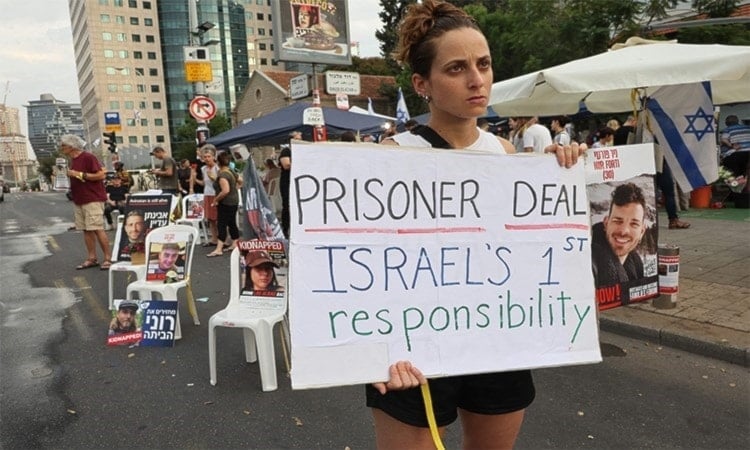Israelis losing confidence in Netanyahu's gov. due to Gaza war conduct
An Israeli poll shows that a significant number of the entity's internal front views their government's propaganda against Hamas during the war as poor.
-

An Israeli settler holds a placard calling for a "prisoner deal" between the entity's government and the Resistance in Gaza as a top priority in "Tel Aviv", occupied Palestine, in October 2023 (AFP)
As the war on Gaza approaches the 12th week, an Israeli poll has shed light on several significant sentiments among Israelis, many of which indicate a growing frustration with the entity's performance regarding the war on Gaza and a decline in support of Prime Minister Benjamin Netanyahu.
Many Israelis now hold the belief that the Israeli government's propaganda against Hamas during the war has been "poor." Additionally, a majority of settlers have expressed a loss of confidence in the current leadership under Netanyahu.
The survey, conducted by the Israeli "Institute for Democracy," reveals that 69% of Israelis support the idea of holding new elections immediately after the cessation of the aggression on Gaza. Furthermore, the data indicates that 64% of respondents believe that "Israel" lacks a well-structured post-war plan.
Moreover, data showed that 39% of Israelis have evaluated "Israel's" propaganda efforts since the beginning of the war as either "poor" or "very poor". This comes in the aftermath of the widespread global protests, particularly in Western countries, condemning Israeli actions in Gaza and demanding a ceasefire, as well as the delivery of humanitarian aid to the region.
Families of Israeli captives set up tents on Saturday at the main entrance to the Security Ministry and announced that they would focus all their protest activities there until the cabinet presents a plan for bringing back the captives held by the Resistance in Gaza.
In a message to Netanyahu's government, the protesters demanded action on a new prisoner exchange deal with the Resistance.
This comes after Israeli newspaper Maariv reported that the captives' families held by are escalating their protests in rejection of the government's current performance regarding the release of Israelis held in Gaza.
"With every critical minute, the lives of our prisoners are in real danger, and we only receive them one after the other as corpses... We only receive dead bodies, not responses, only dead prisoners," said the demonstrators.
Higher price
Concerning a potential prisoner exchange deal, 64.5% of Israelis do not believe that the entity can secure the release of captives held by the Palestinian Resistance in Gaza. In contrast, only 35.5% believe that the possibility of recovering all captives is high, according to the survey results.
In this context, Yedioth Ahronoth reported that "Israel" anticipates that Hamas will demand a high price for the release of Israeli male captives, suggesting that negotiations on this matter could be protracted and intricate.
Additionally, the newspaper emphasized the potential risks associated with the entity's decision to resume negotiations for a prisoner exchange, including its potential impact on a ground incursion into Gaza.
Quoting a diplomatic source, the media outlet reported, "The coming days will be critical and marked by pressures because Israel is not in control of the situation. The head of Mossad took this step, and the pressure will shift from the United States to Qatar and from Qatar to Hamas," with this process expected to unfold "in the coming few days."
The news outlet asserted that it is evident that Hamas will demand a higher price this time, especially since it involves male captives and may potentially include the release of high-profile prisoners.
Maintaining pressure or a temporary truce
Both Netanyahu and Security Minister Yoav Gallant have repeatedly emphasized that "military pressure is the only thing that works with Hamas." However, Hamas has rejected this notion, with its top officials emphasizing that they will "not negotiate while the aggression on Gaza continues."
According to the report, an increase in Israeli military pressure on Hamas is anticipated, as the entity believes that only such pressure will compel the Resistance to be flexible in negotiating a prisoner exchange deal.
Meanwhile, the report also pointed out that "Israel" is aware that the situation this time may be more complex than before. This is because "Hamas's goal in Gaza is to secure long periods of ceasefire, and Israel is not prepared for that. Instead, it operates on the principle of releasing captives in exchange for days of truce, nothing more."
Regarding the continuation of aggression or the pursuit of a temporary truce, former Security Minister Avigdor Lieberman, who leads the opposition Yisrael Beiteinu party, stated that "the war is Netanyahu's means of staying in power."
He added in an interview with Israeli radio station Reshet Bet that there appears to be a chaotic war cabinet that does not understand the objectives or direction of its actions.

 5 Min Read
5 Min Read








